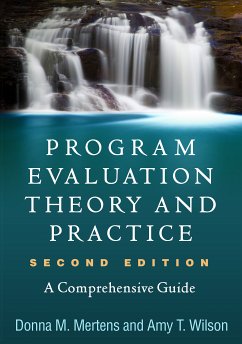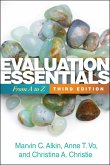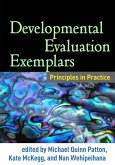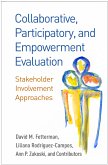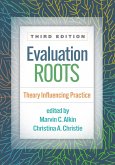Donna M. Mertens, Amy T. Wilson
Program Evaluation Theory and Practice (eBook, ePUB)
A Comprehensive Guide
65,95 €
65,95 €
inkl. MwSt.
Sofort per Download lieferbar

33 °P sammeln
65,95 €
Als Download kaufen

65,95 €
inkl. MwSt.
Sofort per Download lieferbar

33 °P sammeln
Jetzt verschenken
Alle Infos zum eBook verschenken
65,95 €
inkl. MwSt.
Sofort per Download lieferbar
Alle Infos zum eBook verschenken

33 °P sammeln
Donna M. Mertens, Amy T. Wilson
Program Evaluation Theory and Practice (eBook, ePUB)
A Comprehensive Guide
- Format: ePub
- Merkliste
- Auf die Merkliste
- Bewerten Bewerten
- Teilen
- Produkt teilen
- Produkterinnerung
- Produkterinnerung

Bitte loggen Sie sich zunächst in Ihr Kundenkonto ein oder registrieren Sie sich bei
bücher.de, um das eBook-Abo tolino select nutzen zu können.
Hier können Sie sich einloggen
Hier können Sie sich einloggen
Sie sind bereits eingeloggt. Klicken Sie auf 2. tolino select Abo, um fortzufahren.

Bitte loggen Sie sich zunächst in Ihr Kundenkonto ein oder registrieren Sie sich bei bücher.de, um das eBook-Abo tolino select nutzen zu können.
Graduate students and instructors in education, psychology, sociology, social work, nursing, public policy, management, and criminal justice; applied researchers and evaluators. Serves as a text in graduate-level evaluation courses.
- Geräte: eReader
- ohne Kopierschutz
- eBook Hilfe
Andere Kunden interessierten sich auch für
![Evaluation Essentials (eBook, ePUB) Evaluation Essentials (eBook, ePUB)]() Marvin C. AlkinEvaluation Essentials (eBook, ePUB)41,95 €
Marvin C. AlkinEvaluation Essentials (eBook, ePUB)41,95 €![Re/Invention (eBook, ePUB) Re/Invention (eBook, ePUB)]() Patricia LeavyRe/Invention (eBook, ePUB)27,95 €
Patricia LeavyRe/Invention (eBook, ePUB)27,95 €![Research Design (eBook, ePUB) Research Design (eBook, ePUB)]() Patricia LeavyResearch Design (eBook, ePUB)39,95 €
Patricia LeavyResearch Design (eBook, ePUB)39,95 €![Theory Construction and Model-Building Skills (eBook, ePUB) Theory Construction and Model-Building Skills (eBook, ePUB)]() James JaccardTheory Construction and Model-Building Skills (eBook, ePUB)54,95 €
James JaccardTheory Construction and Model-Building Skills (eBook, ePUB)54,95 €![Developmental Evaluation Exemplars (eBook, ePUB) Developmental Evaluation Exemplars (eBook, ePUB)]() Developmental Evaluation Exemplars (eBook, ePUB)39,95 €
Developmental Evaluation Exemplars (eBook, ePUB)39,95 €![Collaborative, Participatory, and Empowerment Evaluation (eBook, ePUB) Collaborative, Participatory, and Empowerment Evaluation (eBook, ePUB)]() David M. FettermanCollaborative, Participatory, and Empowerment Evaluation (eBook, ePUB)31,95 €
David M. FettermanCollaborative, Participatory, and Empowerment Evaluation (eBook, ePUB)31,95 €![Evaluation Roots (eBook, ePUB) Evaluation Roots (eBook, ePUB)]() Evaluation Roots (eBook, ePUB)42,95 €
Evaluation Roots (eBook, ePUB)42,95 €-
-
-
Graduate students and instructors in education, psychology, sociology, social work, nursing, public policy, management, and criminal justice; applied researchers and evaluators. Serves as a text in graduate-level evaluation courses.
Dieser Download kann aus rechtlichen Gründen nur mit Rechnungsadresse in A, D ausgeliefert werden.
Hinweis: Dieser Artikel kann nur an eine deutsche Lieferadresse ausgeliefert werden.
Produktdetails
- Produktdetails
- Verlag: Apa Publications
- Seitenzahl: 620
- Erscheinungstermin: 4. Dezember 2018
- Englisch
- ISBN-13: 9781462539871
- Artikelnr.: 54751422
- Verlag: Apa Publications
- Seitenzahl: 620
- Erscheinungstermin: 4. Dezember 2018
- Englisch
- ISBN-13: 9781462539871
- Artikelnr.: 54751422
- Herstellerkennzeichnung Die Herstellerinformationen sind derzeit nicht verfügbar.
Donna M. Mertens, PhD, is Professor Emeritus in the Department of Educational Foundations and Research at Gallaudet University, where she taught advanced research methods and program evaluation to deaf and hearing students. She received the Distinguished Faculty Award from Gallaudet. The primary focus of her work is transformative mixed methods inquiry in diverse communities, with priority given to the ethical implications of research in pursuit of social justice. A past president of the American Evaluation Association (AEA), Dr. Mertens provided leadership in the development of the International Organization for Cooperation in Evaluation and the establishment of the AEA Diversity Internship Program with Duquesne University. She has received AEA's highest honors for service to the organization and the field, as well as for her contributions to evaluation theory. She is the author of several books and is widely published in major professional journals. Dr. Mertens conducts and consults on evaluations in many countries, including Chile, Japan, Sri Lanka, Guatemala, Egypt, India, South Africa, Botswana, Israel, Australia, New Zealand, and Costa Rica. Amy T. Wilson, PhD, is Director of Mill Neck International at the Mill Neck Family of Organizations, where she leads a team of deaf education specialists who share their expertise, knowledge, and technical skills with parents, educators, and professionals in economically poor countries. Dr. Wilson was a professor in the Department of Educational Foundations and Research at Gallaudet University for 14 years. After living in developing countries and noting the poor assistance people with disabilities were receiving from U.S. development organizations, she developed Gallaudet's MA degree in International Development. The degree, which is the only one of its kind in the United States, focuses on the inclusion of people with disabilities in development assistance programs and in nongovernmental, federal, and faith-based development organizations both in the United States and overseas. Dr. Wilson was Program Director of the International Development Program; she also taught deaf and hearing students research and evaluation, theory and practice of international development, micropolitics, community development with people with disabilities, multicultural education, and gender, disability, and development. Dr. Wilson evaluates and advises development organizations and agencies (e.g., U.S. Agency for International Development, the InterAmerican Development Bank, the World Bank, and the Peace Corps) about the inclusiveness of their programs, as well as their effectiveness with various disability communities.
Preface
I. The Landscape of Evaluation
1. Introduction to Evaluation: Defining Terms and Ethical Considerations
2. History of Evaluation and Philosophical Frameworks
II. Evaluation Paradigms, Branches, Theories, and Approaches
3. The Postpositivist Paradigm and the Methods Branch
4. The Pragmatic Paradigm and the Use Branch
5. The Constructivist Paradigm and the Values Branch
6. The Transformative Paradigm and the Social Justice Branch
7. The Indigenous Paradigm and the Needs and Context Branch
III. Planning Evaluations
8. Working with Stakeholders: Establishing the Context and the Evaluand
9. Evaluation Purposes, Types, and Questions
10. Evaluation Designs
11. Data Collection Strategies and Indicators
12. Stakeholders, Participants, and Sampling
13. Data Analysis and Interpretation
IV. Implementation in Evaluation: Communication and Utilization of
Findings, Management, Meta-Evaluation, and Challenges
14. Communication and Utilization of Findings
15. Meta-Evaluation and Project Management
16. Perennial and Emerging Challenges in Evaluation
Glossary
References
Author Index
Subject Index
About the Authors
I. The Landscape of Evaluation
1. Introduction to Evaluation: Defining Terms and Ethical Considerations
2. History of Evaluation and Philosophical Frameworks
II. Evaluation Paradigms, Branches, Theories, and Approaches
3. The Postpositivist Paradigm and the Methods Branch
4. The Pragmatic Paradigm and the Use Branch
5. The Constructivist Paradigm and the Values Branch
6. The Transformative Paradigm and the Social Justice Branch
7. The Indigenous Paradigm and the Needs and Context Branch
III. Planning Evaluations
8. Working with Stakeholders: Establishing the Context and the Evaluand
9. Evaluation Purposes, Types, and Questions
10. Evaluation Designs
11. Data Collection Strategies and Indicators
12. Stakeholders, Participants, and Sampling
13. Data Analysis and Interpretation
IV. Implementation in Evaluation: Communication and Utilization of
Findings, Management, Meta-Evaluation, and Challenges
14. Communication and Utilization of Findings
15. Meta-Evaluation and Project Management
16. Perennial and Emerging Challenges in Evaluation
Glossary
References
Author Index
Subject Index
About the Authors
Preface
I. The Landscape of Evaluation
1. Introduction to Evaluation: Defining Terms and Ethical Considerations
2. History of Evaluation and Philosophical Frameworks
II. Evaluation Paradigms, Branches, Theories, and Approaches
3. The Postpositivist Paradigm and the Methods Branch
4. The Pragmatic Paradigm and the Use Branch
5. The Constructivist Paradigm and the Values Branch
6. The Transformative Paradigm and the Social Justice Branch
7. The Indigenous Paradigm and the Needs and Context Branch
III. Planning Evaluations
8. Working with Stakeholders: Establishing the Context and the Evaluand
9. Evaluation Purposes, Types, and Questions
10. Evaluation Designs
11. Data Collection Strategies and Indicators
12. Stakeholders, Participants, and Sampling
13. Data Analysis and Interpretation
IV. Implementation in Evaluation: Communication and Utilization of
Findings, Management, Meta-Evaluation, and Challenges
14. Communication and Utilization of Findings
15. Meta-Evaluation and Project Management
16. Perennial and Emerging Challenges in Evaluation
Glossary
References
Author Index
Subject Index
About the Authors
I. The Landscape of Evaluation
1. Introduction to Evaluation: Defining Terms and Ethical Considerations
2. History of Evaluation and Philosophical Frameworks
II. Evaluation Paradigms, Branches, Theories, and Approaches
3. The Postpositivist Paradigm and the Methods Branch
4. The Pragmatic Paradigm and the Use Branch
5. The Constructivist Paradigm and the Values Branch
6. The Transformative Paradigm and the Social Justice Branch
7. The Indigenous Paradigm and the Needs and Context Branch
III. Planning Evaluations
8. Working with Stakeholders: Establishing the Context and the Evaluand
9. Evaluation Purposes, Types, and Questions
10. Evaluation Designs
11. Data Collection Strategies and Indicators
12. Stakeholders, Participants, and Sampling
13. Data Analysis and Interpretation
IV. Implementation in Evaluation: Communication and Utilization of
Findings, Management, Meta-Evaluation, and Challenges
14. Communication and Utilization of Findings
15. Meta-Evaluation and Project Management
16. Perennial and Emerging Challenges in Evaluation
Glossary
References
Author Index
Subject Index
About the Authors
